new posts in all blogs
Viewing: Blog Posts Tagged with: vaunda micheaux nelson, Most Recent at Top [Help]
Results 1 - 8 of 8
How to use this Page
You are viewing the most recent posts tagged with the words: vaunda micheaux nelson in the JacketFlap blog reader. What is a tag? Think of a tag as a keyword or category label. Tags can both help you find posts on JacketFlap.com as well as provide an easy way for you to "remember" and classify posts for later recall. Try adding a tag yourself by clicking "Add a tag" below a post's header. Scroll down through the list of Recent Posts in the left column and click on a post title that sounds interesting. You can view all posts from a specific blog by clicking the Blog name in the right column, or you can click a 'More Posts from this Blog' link in any individual post.

By:
Betsy Bird,
on 3/30/2016
Blog:
A Fuse #8 Production
(
Login to Add to MyJacketFlap)
JacketFlap tags:
Reviews,
Best Books,
Carolrhoda Books,
multicultural children's literature,
Vaunda Micheaux Nelson,
multicultural picture books,
Lerner Publishing Group,
Elizabeth Zunon,
African-American books,
Best Books of 2016,
2016 picture books,
2016 reviews,
Reviews 2016,
Add a tag
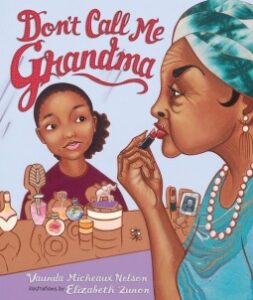 Don’t Call Me Grandma
Don’t Call Me Grandma
By Vaunda Micheaux Nelson
Illustrated by Elizabeth Zunon
Carolrhoda Books (a division of Lerner)
$19.99
ISBN: 978-1-4677-4208-5
Ages 4-7
On shelves now.
In 2016 a picture book won a Newbery Award. Which is to say, a picture book was declared the best-written work for children between the ages of 0-14. After its win there was a fair amount of speculation about what precisely the Newbery committee was trying to say with their award. For that matter, there was a fair amount of speculation about what it meant for children’s literature in general. Are we, as a people, less tolerant of loquacious books? Considering the fact that a book with 592 pages was a runner-up, I think we’re doing just fine in terms of wordy titles. Just the same, I hope that if anything comes out of this surprise award it’s a newfound appreciation for the picture book’s art of restraint. A good picture book shows but doesn’t tell. Don’t believe me? Read the original manuscript of Sendak’s Where the Wild Things Are where he spells everything out for the reader. All these thoughts were in my head recently when I read the remarkable Don’t Call Me Grandma by Vaunda Micheaux Nelson. Tackling the almost nonexistent subcategory of grouchy great-grandparents, Ms. Nelson deftly encapsulates a woman’s personality and lifetime of experiences in a scant 32 pages.
“Great-grandmother Nell is scary.” You got that right, kid. She also does not hug, or kiss, or chase her great-grandchild for fun. Instead she sips an intoxicating beverage from a glass bedecked with a spider. She serves up fish for breakfast, buggy eyes and all. But she also has a vanity full of mysterious perfumes, lipstick as red as rubies, and memories as sharp and painful as the day they were made. And when her great-granddaughter sneaks a kiss, Nell is still scary. But that’s okay. “…I like her that way.”
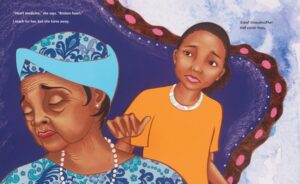 First and foremost, this is not a fuzzy grandparent (or great-grandparent) book. There are plenty of fuzzy books out there, filled to brimming with warm snuggly feelings. If that is the kind of book you require then grab yourself the nearest Nancy Tillman and content yourself accordingly. What we have here instead is a kind of character study. Whatever expectations you carry into this book, they will be upended by the text. Nell is an amazing character, one that I’ve never seen in book of this sort. Her prickly nature may well hide that “broken heart” she mentions obliquely, but it could just as easily hide more prickles. We get three distinct memories of her past, but it’s a single wordless two-page spread that probably says more about her than anything else. As an adult, I found myself speculating about her life. How perhaps she had dreams of dancing professionally but that she put those dreams aside when she had her children at a very young age. No kid is going to read into Nell what I have. That’s what makes reading this book so dynamic. Come for the prickly relative. Stay for the enticing, unknowable back story.
First and foremost, this is not a fuzzy grandparent (or great-grandparent) book. There are plenty of fuzzy books out there, filled to brimming with warm snuggly feelings. If that is the kind of book you require then grab yourself the nearest Nancy Tillman and content yourself accordingly. What we have here instead is a kind of character study. Whatever expectations you carry into this book, they will be upended by the text. Nell is an amazing character, one that I’ve never seen in book of this sort. Her prickly nature may well hide that “broken heart” she mentions obliquely, but it could just as easily hide more prickles. We get three distinct memories of her past, but it’s a single wordless two-page spread that probably says more about her than anything else. As an adult, I found myself speculating about her life. How perhaps she had dreams of dancing professionally but that she put those dreams aside when she had her children at a very young age. No kid is going to read into Nell what I have. That’s what makes reading this book so dynamic. Come for the prickly relative. Stay for the enticing, unknowable back story.
What I would really like to praise in this review, if nothing else, is just how deftly author Vaunda Micheaux Nelson parses words into sentences that swell with meaning. Take, for example, the moment when our heroine enters Great-Grandmother Nell’s bedroom. She considers playing with the cloth ballerina on the best but abstains, saying, “her expression makes me think she might tell.” Later she kisses her great-grandmother in her sleep. “Even asleep, Great-Grandmother Nell is scary. But I like her that way.” The very last line? “She won’t know”. It would be fascinating to see Nelson’s original manuscript. Was it just this sparse and spare? Or was it much longer and cut down to the bone in the editing process? Whichever it was, it works.
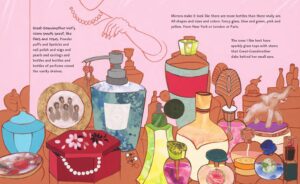 The child in this book is much like the child who will be reading it with an adult. Both she and they sense that there is more at work here than meets the eye. And it is the art by Elizabeth Zunon that backs that feeling up. Elizabeth Zunon has been a force to reckon with for years. I first noticed her when she illustrated William Kamkwamba’s The Boy Who Harnessed the Wind, though I unknowingly had already been a fan of hers when she illustrated Jeanne Harvey’s My Hands Sing the Blues. In Don’t Call Me Grandma she begins with a straightforward contemporary story. Even then, her endpapers start telling the tale long before the words do (not counting the title). She fills these early pages with strings of pearls. Fat pearls, small pearls, pink and gray and white pearls. Note that in the text there is just one mention of those pearls, and it’s in the context of a lot of other things on Nell’s dressing table. But Zunon is getting a grip on her personality in her own way. Because of her we get a distinct sense of Great-Grandmother’s style, poise, and dignity. There are fun little details too, like the family peering out through the window as Nell gives a singing bird what for and how to. Zunon also lends Nell a humanity on the sidelines. When her great-granddaughter looks around her room we see Nell observing affectionately from the sides (though she’d be the first to deny it if you accosted her with the evidence). Then there are the memories. Depicted as splotchy watercolors, Zunon subtly changes her style to indicate how some memories are crystal clear even as they blur and go soft around the edges. The two-page spread of objects representing other memories (everything from photographs of Civil Rights marchers to tickets to an Alvin Ailey ballet) will require giving child readers some context. Nothing wrong with that. Sit them down and explain each thing you see. Don’t recognize something? Look it up!
The child in this book is much like the child who will be reading it with an adult. Both she and they sense that there is more at work here than meets the eye. And it is the art by Elizabeth Zunon that backs that feeling up. Elizabeth Zunon has been a force to reckon with for years. I first noticed her when she illustrated William Kamkwamba’s The Boy Who Harnessed the Wind, though I unknowingly had already been a fan of hers when she illustrated Jeanne Harvey’s My Hands Sing the Blues. In Don’t Call Me Grandma she begins with a straightforward contemporary story. Even then, her endpapers start telling the tale long before the words do (not counting the title). She fills these early pages with strings of pearls. Fat pearls, small pearls, pink and gray and white pearls. Note that in the text there is just one mention of those pearls, and it’s in the context of a lot of other things on Nell’s dressing table. But Zunon is getting a grip on her personality in her own way. Because of her we get a distinct sense of Great-Grandmother’s style, poise, and dignity. There are fun little details too, like the family peering out through the window as Nell gives a singing bird what for and how to. Zunon also lends Nell a humanity on the sidelines. When her great-granddaughter looks around her room we see Nell observing affectionately from the sides (though she’d be the first to deny it if you accosted her with the evidence). Then there are the memories. Depicted as splotchy watercolors, Zunon subtly changes her style to indicate how some memories are crystal clear even as they blur and go soft around the edges. The two-page spread of objects representing other memories (everything from photographs of Civil Rights marchers to tickets to an Alvin Ailey ballet) will require giving child readers some context. Nothing wrong with that. Sit them down and explain each thing you see. Don’t recognize something? Look it up!
A woman of my acquaintance used to make a big show of objecting to any and all picture books that depicted grandmothers as white-haired, doddering old women, tottering on the very edge of the grave. To her mind, there should be at least as many books that show those women as resourceful, spry, and full of energy. Great-Grandmothers probably have few books where they’re wrecking havoc with the universe. Generally speaking they just dodder and die. There will be no doddering and certainly no dying in Don’t Call Me Grandma, though. Nell isn’t just a character. She comes off the page like a full-blown human being, warts and all (just an expression – Nell would take me to the cleaners if she heard me indicating she has any warts). Sharp and smart, this is one of those picture books I’d like to see more of. Which is to say, stories I’ve never seen before.
On shelves now.
Source: Final copy sent from publisher for review.
Like This? Then Try:
Professional Reviews:


By:
Roger Sutton,
on 11/11/2015
Blog:
Read Roger - The Horn Book editor's rants and raves
(
Login to Add to MyJacketFlap)
JacketFlap tags:
Reviews of the Week,
hbmnov15,
hbmnov15revs,
Reviews,
Nonfiction,
Recommended Books,
Horn Book Magazine,
picture book biographies,
Vaunda Micheaux Nelson,
Add a tag
 The Book Itch: Freedom, Truth & Harlem’s
Greatest Bookstore
The Book Itch: Freedom, Truth & Harlem’s
Greatest Bookstore
by Vaunda Micheaux Nelson; illus. by R. Gregory Christie
Primary, Intermediate Carolrhoda 32 pp.
11/15 978-0-7613-3943-4 $17.99
e-book ed. 978-1-4677-4618-2 $17.99
If the central character of Nelson’s Boston Globe–Horn Book Award-winning No Crystal Stair (rev. 3/12) was the author’s great-uncle, Lewis Michaux, this picture book adaptation of the same source material shifts the focus just enough to give younger readers an introduction to his singular achievement: the National Memorial African Bookstore, founded by Michaux in Harlem in the 1930s. Where No Crystal Stair had more than thirty narrators, this book has but one, Michaux’s young son Lewis, a late-in-life child who witnessed the store’s doings during the tumultuous 1960s. Studded with Michaux’s aphorisms (“Don’t get took! Read a book!”), the book successfully conveys the vibrancy of the bookstore and its habitués, including Muhammad Ali and Malcolm X, whose assassination provides the emotional climax of the story. Christie, whose black-and-white drawings are such an inextricable part of No Crystal Stair, is here allowed full pages drenched with expressionistic color to convey the spirit of the place, time, and people. While middle-graders might need some context to understand that the book is set fifty years in the past, its concerns remain: as Michaux “jokes” to Lewis, “Anytime more than three black people congregate, the police get nervous.” Nelson provides full documentation in a biographical note, and some of the bookseller’s best slogans decorate the endpapers.
From the November/December 2015 issue of The Horn Book Magazine.
The post Review of The Book Itch appeared first on The Horn Book.
 In our November/December issue, our editors asked Vaunda Micheaux Nelson about revisiting the source material of her BGHB Award–winning No Crystal Stair in new picture book The Book Itch. Read the full review of The Book Itch here.
In our November/December issue, our editors asked Vaunda Micheaux Nelson about revisiting the source material of her BGHB Award–winning No Crystal Stair in new picture book The Book Itch. Read the full review of The Book Itch here.
Horn Book Editors: What compelled you to revisit the material from No Crystal Stair to create your picture book The Book Itch?
Vaunda Micheaux Nelson: I was writing in Lewis Jr.’s voice in No Crystal Stair when I realized that his perspective might entice younger readers into Lewis Sr.’s world. Moved by Lewis Jr.’s story, I wanted to explore how his father and the bookstore influenced him in particular. You could say Lewis Jr. cut in line and stepped onto the speaker’s platform, making me pause the longer work.
From the November/December 2015 issue of The Horn Book Magazine.
The post Vaunda Micheaux Nelson on The Book Itch appeared first on The Horn Book.
 Vaunda Micheaux Nelson has signed a deal with the Lerner Publishing Group imprint, Carolrhoda Books. Nelson plans to write a picture book centered on the National Memorial African Bookstore entitled The Book Itch: Freedom, Truth & Harlem’s Greatest Bookstore.
Vaunda Micheaux Nelson has signed a deal with the Lerner Publishing Group imprint, Carolrhoda Books. Nelson plans to write a picture book centered on the National Memorial African Bookstore entitled The Book Itch: Freedom, Truth & Harlem’s Greatest Bookstore.
According to the press release, the story will discuss the uniqueness of this New York City-based establishment and how “people from all over came to Harlem to visit, even famous people―Muhammad Ali and Malcolm X, to name a few. In his father’s bookstore people bought and read books, and they also learned from each other.”
The bookstore was in operation from 1932 to 1974. R. Gregory Christie has come on board to create the illustrations. The publication date has been set for Nov. 1.

By: Samantha McGinnis,
on 2/3/2015
Blog:
First Book
(
Login to Add to MyJacketFlap)
JacketFlap tags:
Book lists,
Books & Reading,
Black history month,
African-American history,
Bad News for Outlaws,
Laurie Halse Anderson,
Kathleen Krull,
Chains,
Maya Angelou,
Bryan Collier,
Doreen Rappaport,
Martin's Big Words,
I Know Why The Caged Bird Sings,
Vaunda Micheaux Nelson,
Wilma Unlimited,
Add a tag
February is Black History Month and to celebrate we’re sharing five of our favorite books that honor the history and legacy of African Americans.
If you work with kids in need, you can find these and other great titles to celebrate Black History Month on the First Book Marketplace.
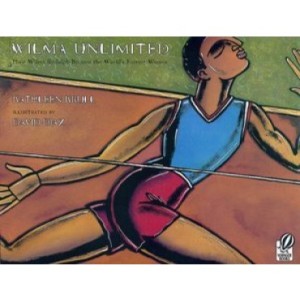 Wilma Unlimited: How Wilma Rudolph Became the World’s Fastest Woman by Kathleen Krull
Wilma Unlimited: How Wilma Rudolph Became the World’s Fastest Woman by Kathleen Krull
Before Wilma Rudolph was five years old, polio had paralyzed her left leg. Everyone said she would never walk again. But Wilma refused to believe it. Not only would she walk again, she vowed, she’d run. And she did run—all the way to the Olympics, where she became the first American woman to earn three gold medals in a single olympiad. This dramatic and inspiring true story is illustrated in bold watercolor and acrylic paintings by Caldecott Medal-winning artist David Diaz.
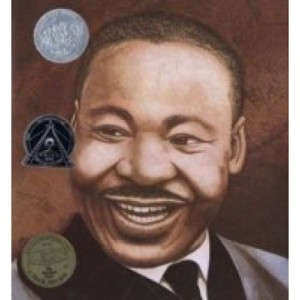 Martin’s Big Words: The Life of Dr. Martin Luther King, Jr. by Doreen Rappaport and Bryan Collier
Martin’s Big Words: The Life of Dr. Martin Luther King, Jr. by Doreen Rappaport and Bryan Collier
This picture book biography of Dr. Martin Luther King, Jr. brings his life and the profound nature of his message to young children through his own words. Martin Luther King, Jr., was one of the most influential and gifted speakers of all time. Doreen Rappaport uses quotes from some of his most beloved speeches to tell the story of his life and his work in a simple, direct way. Bryan Collier’s stunning collage art combines remarkable watercolor paintings with vibrant patterns and textures.
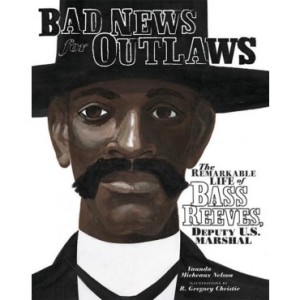 Bad News for Outlaws: The Remarkable Life of Bass Reeves, Deputy U. S. Marshal by Vaunda Micheaux Nelson
Bad News for Outlaws: The Remarkable Life of Bass Reeves, Deputy U. S. Marshal by Vaunda Micheaux Nelson
Sitting tall in the saddle, with a wide-brimmed black hat and twin Colt pistols on his belt, Bass Reeves seemed bigger than life. Outlaws feared him. Law-abiding citizens respected him. As a peace officer, he was cunning and fearless. When a lawbreaker heard Bass Reeves had his warrant, he knew it was the end of the trail, because Bass always got his man, dead or alive. Born into slavery in 1838, Bass had a hard and violent life, but he also had a strong sense of right and wrong that others admired. When Judge Isaac Parker tried to bring law and order to the lawless Indian Territories, he chose Bass to be a deputy U.S. Marshall. Bass would quickly prove a smart choice. The story of Bass Reeves is the story of a remarkable African American and a remarkable hero of the Old West.
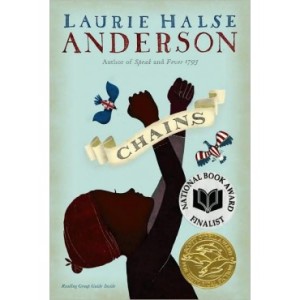 Chains by Laurie Halse Anderson
Chains by Laurie Halse Anderson
As the Revolutionary War begins, thirteen-year-old Isabel wages her own fight…for freedom. Promised freedom upon the death of their owner, she and her sister, Ruth, in a cruel twist of fate become the property of a malicious New York City couple, the Locktons, who have no sympathy for the American Revolution and even less for Ruth and Isabel. When Isabel meets Curzon, a slave with ties to the Patriots, he encourages her to spy on her owners, who know details of British plans for invasion. She is reluctant at first, but when the unthinkable happens to Ruth, Isabel realizes her loyalty is available to the bidder who can provide her with freedom.
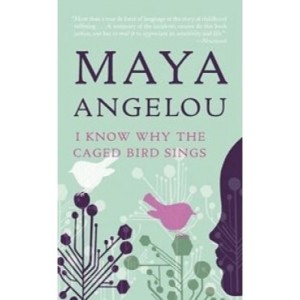 I Know Why The Caged Bird Sings by Maya Angelou
I Know Why The Caged Bird Sings by Maya Angelou
Sent by their mother to live with their devout, self-sufficient grandmother in a small Southern town, Maya and her brother, Bailey, endure the ache of abandonment and the prejudice of the local “powhitetrash.” At eight years old and back at her mother’s side in St. Louis, Maya is attacked by a man many times her age–and has to live with the consequences for a lifetime. Years later, in San Francisco, Maya learns about love for herself and the kindness of others, her own strong spirit, and the ideas of great authors (“I met and fell in love with William Shakespeare”) will allow her to be free instead of imprisoned.
*Book descriptions shown are publisher descriptions and have not been written by First Book.
The post 5 Books to Celebrate Black History Month appeared first on First Book Blog.

 No Crystal Stair: A Documentary Novel of the Life and Work of Lewis Michaux, Harlem Bookseller by Vaunda Micheaux Nelson; illustrated by R. Gregory Christie
No Crystal Stair: A Documentary Novel of the Life and Work of Lewis Michaux, Harlem Bookseller by Vaunda Micheaux Nelson; illustrated by R. Gregory Christie
Documents, photos, fictionalized and true accounts of historical figures and events are woven together in this portrait of Nelson’s larger-than-life great uncle Lewis Michaux. What to you make of the blending of elements and genres in this work (which I described as “defying categorization” when presenting the Boston Globe-Horn Book Award for Fiction in 2012)?
Note from Lolly: Here is a link to Vaunda Micheaux Nelson’s and R. Gregory Christie’s acceptance speeches when this book won the Boston Globe-Horn Book Award:
YouTube video
Print version

The post No Crystal Stair appeared first on The Horn Book.

 No Crystal Stair: A Documentary Novel of the life and work of Lewis Michaux, Harlem Bookseller Vaunda Micheaux Nelson
No Crystal Stair: A Documentary Novel of the life and work of Lewis Michaux, Harlem Bookseller Vaunda Micheaux Nelson
Guys, there is a reason this fantastic book won the Hornbook/Boston Globe award for fiction.
The son of a storeowner in Newport News, Lewis Michaux was in and out of trouble as a child and young man. Inspired by Marcus Garvey's work to connect African-Americans with Africa, Lewis found his calling when he opened up the National Memorial African Bookstore. People told him it wouldn't succeed, but with excellent salesmanship and a natural charisma, Michaux's bookstore became a landmark and an important meeting place and resource. People came to talk to him and learn from him just as much as they came for the books. He even had a library in the back where you could read and learn for free.
Michaux was Micheaux Nelson's great-uncle (she explains the "e" in her author's note.) She set out to write a biography of her relative, but so many details couldn't be tracked down (including what year the store opened!) that she just didn't have enough material, so she took what she did have and filled in the gaps and wrote a fiction book.
As she said at the Horn Book Awards "When a writer begins to invent, you need to own up to that & call it fiction" (*cough*kadirnelson*cough*)
Now this is a book told in stuff, so let's talk format.
Most of the text is told from different characters--Lewis, Lewis's family, store customers, authors, etc. Many are real, a few aren't. Most characters only speak for a few paragraphs. Mixed in are newspaper articles, photographs, and excerpts from Michaux's FBI file. These are all actual source materials and not fiction. There's some other (real) ephemera, too--newsletters, funeral notices, business cards, advertisements, etc. Running through it are R. Gregory Christie's sketches, which really add to the feel of the book.
It's fascinating reading, especially as it paints the different views within the black community during the 50s/60s/70s. Lewis and his brother differed over many things, but towards the end, especially Lewis's relationship with Malcolm X. (Malcolm X frequently spoke at the store and often got mail there. Michaux was supposed to be on stage with him with Malcolm X was assassinated, but was running late.) How much FBI material there is on him, and why, is chilling.
It's also a wonderful story about the role a bookstore played in history and the community, and everything that a bookstore offers beyond merchandise.
The "stuff" format allows Micheuax Nelson to seamlessly blend the non-fiction material she had with the fiction she created (what's what is explained in the author's note.) It also leads to a more vignette-y type narrative, which allows her to cover 70 years of his life, which out it getting bogged down or too long.
It's an important book in that it highlights a fascinating part of America's past. But it's a good book because Micheaux Nelson can tell a story. The weight of history doesn't pull it down, the extra material adds to the engaging nature of the narrative instead of detracting. She not only tells us the story of her family, but paints a wonderful picture of Harlem and the greater scene without it getting in the way of what is, at its heart, the story of a man trying to get a neighborhood to wake up and read. It all ties together in a fantastic package that deserves many more awards and a hell of a lot more buzz than it's been getting.
Book Provided by... my local library
Links to Amazon are an affiliate link. You can help support Biblio File by purchasing any item (not just the one linked to!) through these links. Read my full disclosure statement.
The Remarkable Life of Bass Reeves,Deputy U.S. Marshalby Vaunda Micheaux Nelsonillustrations by R. Gregory ChristieCarolrhoda Books 2009A picture book biography, done right, of the African American lawman who was feared in his day but nearly lost to history.This book starts off the way many good books do, and should, especially biographies: with a solid action sequence that pulls the reader in
 Don’t Call Me Grandma
Don’t Call Me Grandma First and foremost, this is not a fuzzy grandparent (or great-grandparent) book. There are plenty of fuzzy books out there, filled to brimming with warm snuggly feelings. If that is the kind of book you require then grab yourself the nearest Nancy Tillman and content yourself accordingly. What we have here instead is a kind of character study. Whatever expectations you carry into this book, they will be upended by the text. Nell is an amazing character, one that I’ve never seen in book of this sort. Her prickly nature may well hide that “broken heart” she mentions obliquely, but it could just as easily hide more prickles. We get three distinct memories of her past, but it’s a single wordless two-page spread that probably says more about her than anything else. As an adult, I found myself speculating about her life. How perhaps she had dreams of dancing professionally but that she put those dreams aside when she had her children at a very young age. No kid is going to read into Nell what I have. That’s what makes reading this book so dynamic. Come for the prickly relative. Stay for the enticing, unknowable back story.
First and foremost, this is not a fuzzy grandparent (or great-grandparent) book. There are plenty of fuzzy books out there, filled to brimming with warm snuggly feelings. If that is the kind of book you require then grab yourself the nearest Nancy Tillman and content yourself accordingly. What we have here instead is a kind of character study. Whatever expectations you carry into this book, they will be upended by the text. Nell is an amazing character, one that I’ve never seen in book of this sort. Her prickly nature may well hide that “broken heart” she mentions obliquely, but it could just as easily hide more prickles. We get three distinct memories of her past, but it’s a single wordless two-page spread that probably says more about her than anything else. As an adult, I found myself speculating about her life. How perhaps she had dreams of dancing professionally but that she put those dreams aside when she had her children at a very young age. No kid is going to read into Nell what I have. That’s what makes reading this book so dynamic. Come for the prickly relative. Stay for the enticing, unknowable back story. The child in this book is much like the child who will be reading it with an adult. Both she and they sense that there is more at work here than meets the eye. And it is the art by Elizabeth Zunon that backs that feeling up. Elizabeth Zunon has been a force to reckon with for years. I first noticed her when she illustrated William Kamkwamba’s The Boy Who Harnessed the Wind, though I unknowingly had already been a fan of hers when she illustrated Jeanne Harvey’s My Hands Sing the Blues. In Don’t Call Me Grandma she begins with a straightforward contemporary story. Even then, her endpapers start telling the tale long before the words do (not counting the title). She fills these early pages with strings of pearls. Fat pearls, small pearls, pink and gray and white pearls. Note that in the text there is just one mention of those pearls, and it’s in the context of a lot of other things on Nell’s dressing table. But Zunon is getting a grip on her personality in her own way. Because of her we get a distinct sense of Great-Grandmother’s style, poise, and dignity. There are fun little details too, like the family peering out through the window as Nell gives a singing bird what for and how to. Zunon also lends Nell a humanity on the sidelines. When her great-granddaughter looks around her room we see Nell observing affectionately from the sides (though she’d be the first to deny it if you accosted her with the evidence). Then there are the memories. Depicted as splotchy watercolors, Zunon subtly changes her style to indicate how some memories are crystal clear even as they blur and go soft around the edges. The two-page spread of objects representing other memories (everything from photographs of Civil Rights marchers to tickets to an Alvin Ailey ballet) will require giving child readers some context. Nothing wrong with that. Sit them down and explain each thing you see. Don’t recognize something? Look it up!
The child in this book is much like the child who will be reading it with an adult. Both she and they sense that there is more at work here than meets the eye. And it is the art by Elizabeth Zunon that backs that feeling up. Elizabeth Zunon has been a force to reckon with for years. I first noticed her when she illustrated William Kamkwamba’s The Boy Who Harnessed the Wind, though I unknowingly had already been a fan of hers when she illustrated Jeanne Harvey’s My Hands Sing the Blues. In Don’t Call Me Grandma she begins with a straightforward contemporary story. Even then, her endpapers start telling the tale long before the words do (not counting the title). She fills these early pages with strings of pearls. Fat pearls, small pearls, pink and gray and white pearls. Note that in the text there is just one mention of those pearls, and it’s in the context of a lot of other things on Nell’s dressing table. But Zunon is getting a grip on her personality in her own way. Because of her we get a distinct sense of Great-Grandmother’s style, poise, and dignity. There are fun little details too, like the family peering out through the window as Nell gives a singing bird what for and how to. Zunon also lends Nell a humanity on the sidelines. When her great-granddaughter looks around her room we see Nell observing affectionately from the sides (though she’d be the first to deny it if you accosted her with the evidence). Then there are the memories. Depicted as splotchy watercolors, Zunon subtly changes her style to indicate how some memories are crystal clear even as they blur and go soft around the edges. The two-page spread of objects representing other memories (everything from photographs of Civil Rights marchers to tickets to an Alvin Ailey ballet) will require giving child readers some context. Nothing wrong with that. Sit them down and explain each thing you see. Don’t recognize something? Look it up!


 The Book Itch: Freedom, Truth & Harlem’s
Greatest Bookstore
The Book Itch: Freedom, Truth & Harlem’s
Greatest Bookstore In our November/December issue, our editors asked Vaunda Micheaux Nelson about revisiting the source material of her
In our November/December issue, our editors asked Vaunda Micheaux Nelson about revisiting the source material of her 





 No Crystal Stair: A Documentary Novel of the Life and Work of Lewis Michaux, Harlem Bookseller by Vaunda Micheaux Nelson; illustrated by R. Gregory Christie
No Crystal Stair: A Documentary Novel of the Life and Work of Lewis Michaux, Harlem Bookseller by Vaunda Micheaux Nelson; illustrated by R. Gregory Christie
I’m starting a campaign: Zunon for 2017 Caldecott.
I also loved Elizabeth’s art for One Plastic Bag by Miranda Paul.
This was definitely an intriguing picture book, with a pleasing repetitive structure always beginning with Great Grandmother Nell is … I also loved the circular structure to the story. It begins with her being scary, and ends with her still being scary and yet we’ve grown, as the narrator has to appreciate her prickliness and spunk as we see their developing bond through the sensory details that are presented.
My grandmother’s dressing table, with its powder puffs and perfumes and little pots of rouge, and her dresser with photos of people wearing enigmatic smiles! This brings it all back (tho I wasn’t afraid of my Grandma, only of her creepy fox marten stole).